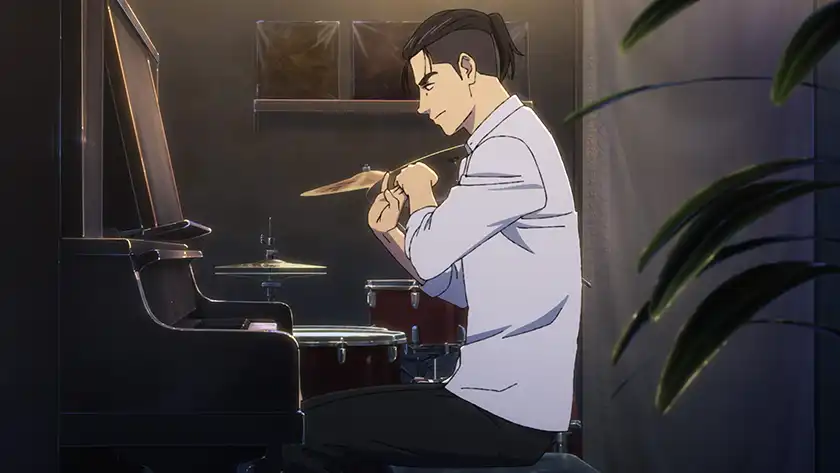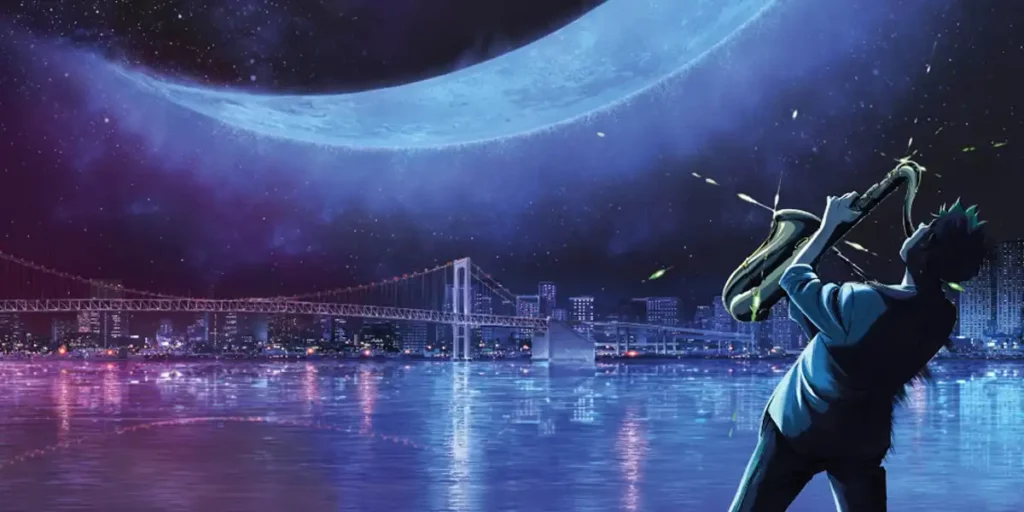Based on a manga, Yuzuru Tachikawa’s anime Blue Giant is a sports film and quest for greatness clothed in the music of jazz.
Blue Giant, directed by Yuzuru Tachikawa, is an anime based on a manga by Shinichi Ishizuka. The Japanese language film, an ode to music and fearless sound, premiered last year in Japan, the US and Canada and is about to be released in Uk and Irish cinemas.
The best way to describe the movie is: Jazz – or Jass, if you’re the film’s trio and need a totally non-obvious band name. Think of the 2004 movie The Terminal, where Tom Hanks’ Viktor Navorski has clippings of Benny Golson and others in an old peanut can. This is the spirit of Blue Giant. All the love for the awesomeness of a sadly dwindling genre is encapsulated and put onto the screen (instead of an old Planters can), most interestingly.
Blue Giant is not a strictly linear story, but it’s set up as one at first. The movie brings us into a world where we think we will follow the journey of a single protagonist, Dai Miyamoto (Yuki Yamada). But instead, as the story goes on, it is more like a venture into jazz composition, where each instrument, or in this case, character takes a turn telling the story of Jass. At the start of the movie, we are solely focused on Dai’s story. Dai is a teenager who wants to be the greatest jazz musician in the world. This is a tall task for anyone, let alone for a high school basketball player from Sendai with no formal music training.
Dai’s drive is not unfamiliar to fans of sports movies: the quest for greatness has been done, and that particular type of movie has expectations that this film fulfills. Blue Giant certainly features its share of “training” montages, with, at times, achingly beautiful animation in riverbanks and in severe weather, as Dai practices. The anime The First Slam Dunk, which starts with the story of high school basketball point guard Ryota Miyagi, is a good example of how the narrative point of view shifts with Blue Giant.
Like jazz, the story shifts, and we dip between the future and the past. A bathroom meeting at a club introduces us to one of our other main characters, “technical” pianist Yukinori Sawabe (Shōtarō Mamiya). Yukinori is around the same age as Dai but carries himself with confidence and cockiness. The self-assuredness will come back to bite Yukinori as Blue Giant progresses, and he will be humbled and grow. As the story goes on, a third person joins their little group: Shunji Tamada (Amane Okayama), a completely amateur drummer and roommate to Dai.
With “Jass” complete, we branch away from Dai and the regular flow of time. Blue Giant becomes less of a Dai story about how everyone is an amateur at first, and, instead, evolves into the animated and non sequential personification of jazz itself. It is full of soul and feels almost improvised, but of course, it isn’t – movies are their own versions of structured classical symphonies, where each part, from script to animation to acting, plays a part. In some ways, the tone of Blue Giant shifts to the drama and tension between the bandmates. Like in That Thing You Do!, the quest for music greatness has an ego.

Like other films that explore the sacrifice of what it takes to become the best, Blue Giant isn’t without sadness. There is tragedy in this anime, but it doesn’t reach the levels of the cursed Von Erich brothers in The Iron Claw. Music notes that come alive and close-up shots on hands foreshadow what is to come. If you were a fortune teller (or had read the manga before), the moment that changes the course of their lives wouldn’t be as shocking, but if you’re an ordinary viewer, it hits hard with heavy emotional gravity.
The animation in Blue Giant is mostly quite stunning. The transition between computer-animated and hand-drawn is evident during the highly technical jazz concert sequences. It can be disorienting. Despite the jarring juxtaposition, the film has moments of absolute beauty. Instruments are drawn and lit with an almost reverence, reminiscent of still-life portraits you’d see in museums. The pianos, saxophones, and drums pop out from the story in the most delightful way.
Although the movie is based on a wildly popular manga series with millions of sales and several spinoffs, it is not necessary to read the source material beforehand to have an appreciation for Blue Giant. The film stands on its own as a work of art. It’s a testament to the skillful writing by NUMBER 8 and Shinichi Ishizuka, as well as direction by Tachikawa, that while watching, you don’t feel as if you’re missing some crucial information to truly understand what is happening on screen. The characters and their goals all come through quite clearly. Blue Giant is not a The Golden Compass situation, where you need to have read Phillip Pullman’s book (or maybe the cliff notes) to understand what’s happening on screen.
This is unapologetically a movie about jazz. The score by Hiromi Uehara is the main character in the film, rightfully overshadowing the human stories of Yukinori, Tamada, and even Dai. The music is initially uncomplicated and still beautiful but rapidly grows to match the growth of the on-screen characters’ skills. As they practice and begin to master their instruments, so too does the jazz from Uehara evolve. The score has a beautiful arc throughout Blue Giant. If you don’t like jazz, you will surely come away from the movie with some appreciation of the genre.
Although Blue Giant is an animated tale, the movie is not appropriate for younger audiences. It is largely beautifully animated and scored, but moments of rude humor and crass language make it a film best left for older adolescents.
The movie is worth checking out on the big screen, not only for the animation but also for the incredible jazz soundtrack.
Blue Giant will be released in selected cinemas across the UK and Ireland from 31 January 2024 in Japanese with English subtitles. In the US, the film had a limited theatrical release in October and will be released soon on digital and on demand. Read our reviews of Chicago, Ronnie’s, and The Blues Under the Skin!

